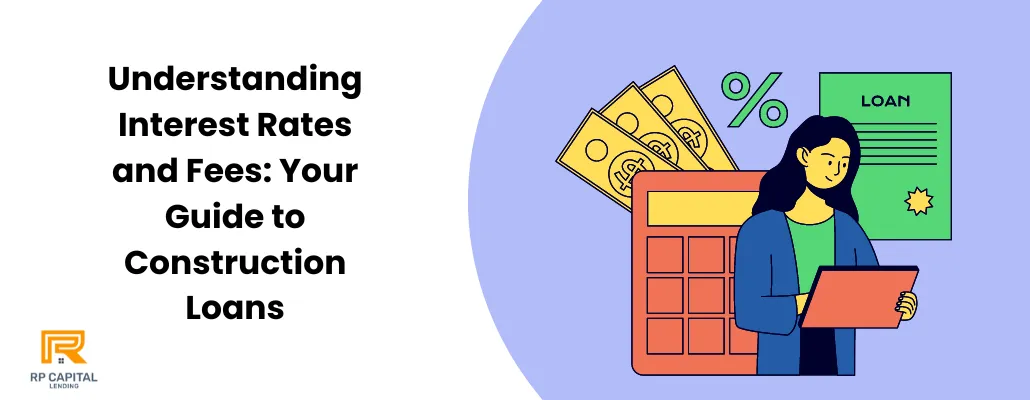Blog

Understanding Interest Rates and Fees: Your Guide to Construction Loans
Building your dream home is an exciting journey, but navigating the complexities of construction loans can be daunting. With the right information on interest rates and fees, you can make informed decisions and avoid unexpected costs.
Let's dive into the essentials of construction loan interest rates and fees to help you get started.
What is Construction Loan?
A construction loan is a short-term loan used to finance the building of a new home or other real estate project. Unlike traditional mortgages, which provide a lump sum payment upfront, construction loans disburse funds in stages as the construction progresses.
Key Features
Short-Term Financing: Construction loans typically last for one year, covering the construction period.
Variable Interest Rates: Most construction loans come with variable interest rates that can fluctuate based on market conditions.
Draw Process: Funds are released in phases, known as draws, which correspond to different stages of construction. Each draw requires inspection and approval by the lender.
Interest-Only Payments: During construction, borrowers usually make interest-only payments based on the amount disbursed. Full repayment begins once the loan converts to a permanent mortgage.
Understanding Interest Rates
Variable vs. Fixed Rates: Construction loans often come with variable interest rates that can fluctuate with the market. Some lenders may offer fixed rates, but these are less common.
Rate Lock: Some lenders provide a rate lock option, which allows you to secure a specific interest rate for a set period. This can protect you from rising rates during the construction period.
Prime Rate: Construction loan interest rates are typically tied to the prime rate, which is the interest rate banks charge their most creditworthy customers. Your rate will usually be the prime rate plus a certain percentage.
Credit Score Impact: Your credit score significantly affects the interest rate you're offered. Higher credit scores generally result in lower interest rates.
Understanding Fees
Origination Fees: These are fees charged by the lender for processing your loan application. They are usually a percentage of the total loan amount.
Inspection Fees: Lenders require inspections during different phases of construction to ensure the project is on track. Each inspection typically incurs a fee.
Draw Fees: Every time you request a portion of the loan funds, known as a "draw," the lender may charge a fee.
Closing Costs: These include various fees such as title insurance, attorney fees, and recording fees. Be prepared for these costs at both the start and end of the loan process.
Contingency Reserve: Some lenders require a contingency reserve, a percentage of the loan amount set aside to cover unexpected expenses during construction.
FAQs About Construction Loans
1. What is the difference between a construction loan and a traditional mortgage?
A construction loan is a short-term loan used to finance the building of a home, while a traditional mortgage is a long-term loan used to buy an existing home. Construction loans cover costs during the building phase and usually convert to a permanent mortgage upon completion.
2. Can I get a fixed interest rate for a construction loan?
While most construction loans have variable rates, some lenders may offer fixed-rate options. These are less common, so it's important to shop around and ask lenders about their available options.
3. How does a construction loan work?
A construction loan provides funds in stages, or "draws," as the construction progresses. The lender requires inspections at various stages before releasing funds to ensure the project is proceeding as planned.
4. What happens if construction costs exceed the loan amount?
If construction costs exceed the loan amount, you will need to cover the additional costs out of pocket. It's advisable to budget for unexpected expenses and consider a contingency reserve in your loan.
5. How do I qualify for a construction loan?
Qualifying for a construction loan requires a good credit score, a detailed construction plan, a contract with a licensed builder, and a significant down payment. Lenders will also assess your income and ability to repay the loan.
Conclusion
Understanding the interest rates and fees associated with construction loans is crucial for a smooth home-building process. By familiarizing yourself with these aspects, you can make informed decisions, manage your budget effectively, and avoid unexpected financial surprises. Remember to compare different lenders and their terms to find the best fit for your needs.
Building your dream home is a significant investment, and with the right knowledge, you can navigate the complexities of construction loans with confidence.
RP Capital Lending is a d.b.a of RP Capital Partners Inc (NMLS # 2469193) | Privacy Policy
Copyright © 2022. All Rights Reserved.
Disclaimer: Loans only apply to non-owner occupied properties. Rates, terms and conditions offered only to qualified borrowers, may vary upon loan product, deal structure, other applicable considerations, and are subject to change at any time without notice.

